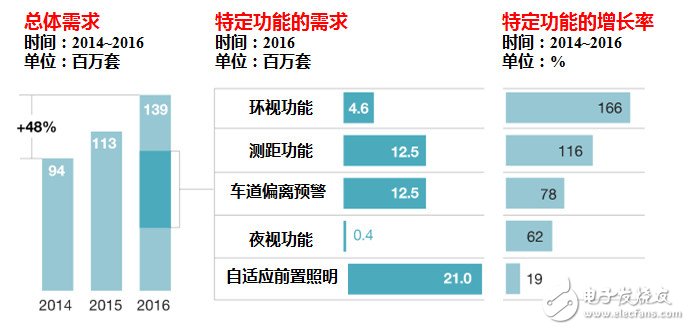What kind of occupations have been replaced by machines recently? One of the alternative answers is car drivers – one of the most popular occupations in the world. Traditional car companies are facing an industrial revolution dominated by technology companies with autonomous driving technology as the core, and various media reports related to them have caused many consumers to produce their next car will be fully autonomous. expected. However, a closer look at the technology needed to achieve high-level autopilot (SAE Level 4 and above) will reveal that it takes more than expected to actually implement and promote this type of car, perhaps five years, perhaps It is 10 years. The first attempt to achieve autonomous driving was mainly focused on the Advanced Driver Assistant Systems (ADAS) field. Features such as Emergency Braking, Backup Camera, Adaptive Cruise Control (AdapTIve Cruise Control) and the automatic parking system (Self-Parking System), these technologies were first applied to luxury cars. In the end, industry regulators began to require some ADAS functions in each car, which accelerated its penetration into the mass market. As of 2016, ADAS technology has formed a market of approximately $15 billion. Globally, the number of ADAS systems (for example, night vision and vehicle blind spot detection) has increased from 90 million in 2014 to about 140 million in 2016, a 50% increase in just two years. Among them, some ADAS functions are more attractive than other functions. For example, from 2014 to 2016, the popularity of Surround-View Parking Systems has increased by more than 150%, while before adaptation. The number of lighting systems (AdapTIve Front-LighTIng Systems) increased by about 20% over the same time period, as shown in Figure 1. Figure 1 Partial market data for the ADAS system The willingness of customers to pay and the decline in product prices have helped the popularity of the ADAS system suite. A recent McKinsey survey found that drivers will spend an average of $500 to $2,500 in order to equip their cars with the appropriate ADAS capabilities. Although the ADAS feature was originally only available on luxury cars, many automakers can now deploy the same ADAS features on cars priced at $20,000. Many high-end cars can not only automatically turn (ie, lateral control), accelerate and brake (ie, longitudinal control) under highway conditions, but also take corresponding actions to avoid collisions. Some commercial passenger cars (such as shuttle buses) that travel on fixed-line lines with limited distance can even park themselves in extremely compact parking spaces. However, although ADAS has made great progress, the industry has not yet determined the best technical prototype for semi-autonomous vehicles (such as SAE Level 3 vehicles), so it is still in test-and-refine mode. So far, there have been three technical routes: Mainly camera (Camera Systems), supplemented by millimeter wave radar; Mainly based on millimeter wave radar (Radar), supplemented by camera; Hybrid route, which combines laser radar, millimeter wave radar, camera and other hardware and sensor fusion algorithms to achieve a more detailed understanding of the environment. The costs of implementing the above technical routes vary, with "mixed routes" being the most expensive. So far, the above three technical routes have not yet decided to win or lose, each system has its advantages and disadvantages, for example, the "millimeter wave radar-based" method can run well in the highway scene, the scene The traffic flow in the middle is relatively easy to predict and the accuracy of mapping the environment is not high. On the other hand, the “hybrid route†approach works better in densely populated urban areas, where accurate mapping can help cars travel along narrow streets and identify smaller but less safe driving. Object.
Brand Name: OEM
Product Name: Multi USB Charger
Use: Mobile Phone
Place of Origin: Guangdong, China (Mainland)
Port: 6 port
Input: AC100-240V 50/60HZ
Size: 90*70*16mm
Weight: 250g
Materials: PC+ABS
Color: Black/White
Warranty: 1 year
Multi USB Charger,Multi Usb Wall Charger,Multiple Usb Port Charger,Multi Port USB Charger Shenzhen Waweis Technology Co., Ltd. , https://www.waweis.com